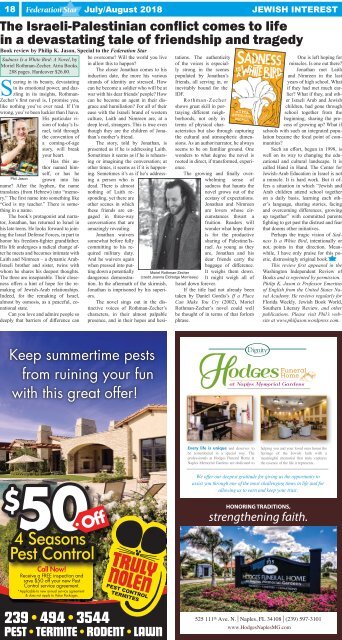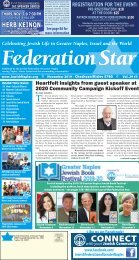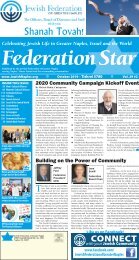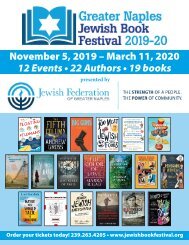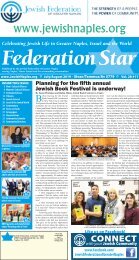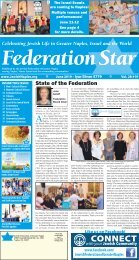Federation Star - July-August 2018
Monthly newspaper of the Jewish Federation of Greater Naples
Monthly newspaper of the Jewish Federation of Greater Naples
You also want an ePaper? Increase the reach of your titles
YUMPU automatically turns print PDFs into web optimized ePapers that Google loves.
239•494•3544<br />
PEST•TERMITE•RODENT•LAWN<br />
18 <strong>Federation</strong> <strong>Star</strong> <strong>July</strong>/<strong>August</strong> <strong>2018</strong><br />
Book review by Philip K. Jason, Special to the <strong>Federation</strong> <strong>Star</strong><br />
Phil Jason<br />
JEWISH INTEREST<br />
The Israeli-Palestinian conflict comes to life<br />
in a devastating tale of friendship and tragedy<br />
Sadness Is a White Bird: A Novel, by<br />
Moriel Rothman-Zecher. Atria Books.<br />
288 pages. Hardcover $26.00.<br />
Searing in its beauty, devastating<br />
in its emotional power, and dazzling<br />
in its insights, Rothman-<br />
Zecher’s first novel is, I promise you,<br />
like nothing you’ve ever read. If I’m<br />
wrong, you’ve been luckier than I have.<br />
His particular vision<br />
of today’s Israel,<br />
told through<br />
the convention of<br />
a coming-of-age<br />
story, will break<br />
your heart.<br />
Has this author<br />
named himself,<br />
or has he<br />
grown into his<br />
name? After the hyphen, the name<br />
translates (from Hebrew) into “memory.”<br />
The first name into something like<br />
“God is my teacher.” There is something<br />
in a name.<br />
The book’s protagonist and narrator,<br />
Jonathan, has returned to Israel in<br />
his late teens. He looks forward to joining<br />
the Israel Defense Forces, in part to<br />
honor his freedom-fighter grandfather.<br />
His life undergoes a radical change after<br />
he meets and becomes intimate with<br />
Laith and Nimreen – a dynamic Arab-<br />
Israeli brother and sister, twins with<br />
whom he shares his deepest thoughts.<br />
The three are inseparable. Their closeness<br />
offers a hint of hope for the remaking<br />
of Jewish-Arab relationships.<br />
Indeed, for the remaking of Israel,<br />
almost by osmosis, as a peaceful, conational<br />
state.<br />
Can you love and admire people so<br />
deeply that barriers of difference can<br />
be overcome? Will the world you live<br />
in allow this to happen?<br />
The closer Jonathan comes to his<br />
induction date, the more his various<br />
strands of identity are stressed. How<br />
can he become a soldier who will be at<br />
war with his dear friends’ people? How<br />
can he become an agent in their disgrace<br />
and humiliation? For all of their<br />
ease with the Israeli brand of western<br />
culture, Laith and Nimreen are, at a<br />
deep level, strangers. This is true even<br />
though they are the children of Jonathan’s<br />
mother’s friend.<br />
The story, told by Jonathan, is<br />
presented as if he is addressing Laith.<br />
Sometimes it seems as if he is rehearsing<br />
or imagining the conversation; at<br />
other times, it seems as if it is happening.<br />
Sometimes it’s as if he’s addressing<br />
a person who is<br />
dead. There is almost<br />
nothing of Laith responding,<br />
yet there are<br />
other scenes in which<br />
these friends are engaged<br />
in three-way<br />
conversations that are<br />
amazingly revealing.<br />
Jonathan waivers<br />
somewhat before fully<br />
committing to his required<br />
military duty.<br />
And he waivers again<br />
when pressed into putting<br />
down a potentially<br />
dangerous demonstration.<br />
In the aftermath of the skirmish,<br />
Jonathan is imprisoned by his superiors.<br />
The novel sings out in the distinctive<br />
voices of Rothman-Zecher’s<br />
characters, in their almost palpable<br />
presence, and in their hopes and hesi-<br />
Moriel Rothman-Zecher<br />
(credit Joanna Eldredge Morrissey)<br />
tations. The authenticity<br />
of the voices is especially<br />
strong in the scenes<br />
populated by Jonathan’s<br />
friends, all serving in, or<br />
inevitably bound for the<br />
IDF.<br />
Rothman-Zecher<br />
shows great skill in portraying<br />
different neighborhoods,<br />
not only in<br />
terms of physical characteristics<br />
but also through capturing<br />
the cultural and atmospheric dimensions.<br />
As an author/narrator, he always<br />
seems to be on familiar ground. One<br />
wonders to what degree the novel is<br />
rooted in direct, if transformed, experience.<br />
The growing and finally overwhelming<br />
sense of<br />
sadness that haunts the<br />
novel grows out of the<br />
ecstasy of expectations.<br />
Jonathan and Nimreen<br />
are lovers whose circumstances<br />
thwart a<br />
fruition. Readers will<br />
wonder what hope there<br />
is for the productive<br />
sharing of Palestine/Israel.<br />
As young as they<br />
are, Jonathan and his<br />
dear friends carry the<br />
baggage of difference.<br />
It weighs them down.<br />
It might weigh all of<br />
Israel down forever.<br />
If the title had not already been<br />
taken by Daniel Gordis’s If a Place<br />
Can Make You Cry (2002), Moriel<br />
Rothman-Zecher’s novel could well<br />
be thought of in terms of that forlorn<br />
phrase.<br />
One is left hoping for<br />
miracles. Is one out there?<br />
Jonathan met Laith<br />
and Nimreen in the last<br />
years of high school. What<br />
if they had met much earlier?<br />
What if they, and other<br />
Israeli Arab and Jewish<br />
children, had gone through<br />
school together from the<br />
beginning, sharing the process<br />
of growing up? What if<br />
schools with such an integrated population<br />
became the focal point of communities?<br />
Such an effort, begun in 1998, is<br />
well on its way to changing the educational<br />
and cultural landscape. It is<br />
called Hand in Hand. The Center for<br />
Jewish-Arab Education in Israel is not<br />
a miracle. It is hard work. But it offers<br />
a situation in which “Jewish and<br />
Arab children attend school together<br />
on a daily basis, learning each other’s<br />
language, sharing stories, facing<br />
and overcoming differences, growing<br />
up together” with committed parents<br />
fighting to get past the distrust and fear<br />
that dooms other initiatives.<br />
Perhaps the tragic vision of Sadness<br />
Is a White Bird, intentionally or<br />
not, points in that direction. Meanwhile,<br />
I have only praise for this poetic,<br />
distressingly original book.<br />
This review fi rst appeared in the<br />
Washington Independent Review of<br />
Books and is reprinted by permission.<br />
Philip K. Jason is Professor Emeritus<br />
of English from the United States Naval<br />
Academy. He reviews regularly for<br />
Florida Weekly, Jewish Book World,<br />
Southern Literary Review, and other<br />
publications. Please visit Phil’s website<br />
at www.philjason.wordpress.com.<br />
Keep summertime pests<br />
from ruining your fun<br />
with this great offer!<br />
Call Now!<br />
Receive a FREE inspection and<br />
save $50 off your new Pest<br />
Control service agreement.<br />
*Applicable to new annual service agreement<br />
& does not apply to Value Packages.


